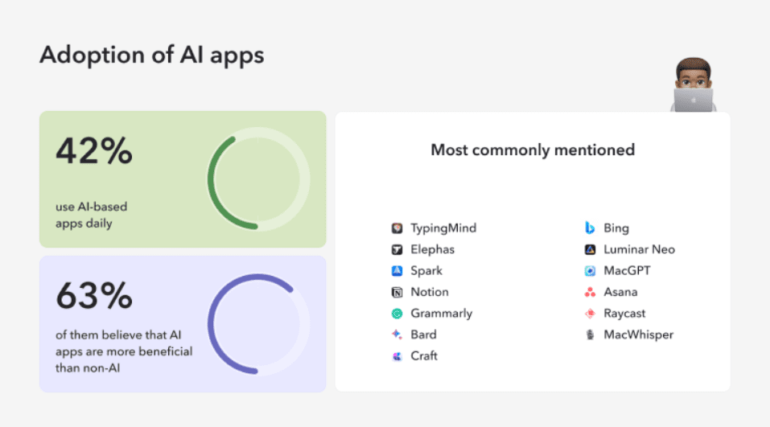TL;DR:
- 42% of Mac users incorporate AI-based apps into their daily routines.
- 63% believe AI apps offer superior benefits compared to non-AI apps.
- 44% of Mac app developers have already integrated AI or machine learning into their apps.
- Top AI apps, including those not native to macOS, are gaining popularity.
- AI is transforming user experiences by providing valuable assistance.
- Adobe’s generative AI adoption contributes to a higher exposure to AI-powered apps.
- Subscriptions are favored over one-time purchases in app adoption.
- Primary app discovery channels include the Mac App Store, YouTube, and social media.
- 70% of respondents own Macs equipped with M1 or M2 chips.
Main AI News:
In a recent study conducted by app subscription service Setapp, it has been revealed that Mac users are wholeheartedly embracing the world of AI applications. The findings of this study show that an impressive 42% of Mac users now incorporate AI-based applications into their daily routines. Furthermore, a substantial 63% of respondents expressed their belief in the superior benefits offered by AI applications compared to their non-AI counterparts.
What’s even more intriguing is the willingness of Mac app developers to adopt AI technology. A notable 44% of them have already integrated AI or machine learning models into their applications, with an additional 28% actively working on incorporating AI elements.
This insightful survey is part of Setapp’s annual report on the state of Mac applications. The company, which offers a subscription service granting access to over 230 Mac applications, collected responses from 1,241 Mac users, primarily in the United States. While the study’s scope may not encompass the global landscape, it sheds light on the burgeoning interest in AI applications among Mac users.
Remarkably, some of the top AI applications identified in the study are not exclusive to macOS. For instance, applications like Google’s AI Bard and Bing have skillfully integrated AI technology from OpenAI, transcending operating system boundaries.
Among the other noteworthy AI applications frequently mentioned by users are TypingMind, Elephas, Spark, Notion, Grammarly, Craft, Luminar Neo, MacGPT, Asana, Raycast, and MacWhisper. It’s worth noting that some of these applications leverage AI to enhance existing functionalities rather than solely focusing on AI interactions.
Mykola Savin, the product lead at Setapp, underscored the transformative role of AI in enhancing user experiences, stating, “We see how AI is transforming the app’s usage experience by providing additional user assistance.” He also mentioned the widespread adoption of AI tools and features on the Setapp platform, emphasizing that users who successfully integrate AI tend to use these features repeatedly.
This year marks the first time Setapp has included questions about AI application adoption in its annual survey. While it’s impossible to quantify the exact increase in daily AI application usage among Mac users compared to previous years, it is evident that AI applications now play a substantial role in their daily workflows.
On average, Mac users have 51 installed applications on their devices, and they access up to 15 of them daily. With 42% reporting daily usage of AI applications, it is clear that AI has become an integral part of their daily routines.
Aside from AI applications, other frequently used applications include web browsers, Microsoft and Google Office tools (both of which incorporate AI technologies), and Adobe software. Adobe’s embrace of generative AI in various apps, including Photoshop and other Creative Cloud applications, further contributes to users’ exposure to AI-powered applications.
The survey also provides valuable insights into the broader landscape of Mac application adoption and discovery. Notably, subscription-based models have gained popularity over one-time purchases. The primary channels for app discovery include the Mac App Store, YouTube, and social media platforms.
Additionally, an impressive 70% of survey respondents reported owning a Mac equipped with either an M1 or M2 chip, highlighting the ongoing evolution of Mac hardware and its alignment with the growing trend of AI application usage.
Conclusion:
The rapid adoption of AI-based applications among Mac users signals a significant shift in the market. This trend not only highlights the growing demand for AI-powered solutions but also underscores the importance of developers incorporating AI technology into their offerings. With a majority of users favoring subscription-based models and increasing exposure to AI applications, businesses should prioritize AI integration and strategic marketing through channels like the Mac App Store and social media to stay competitive in this evolving landscape.

